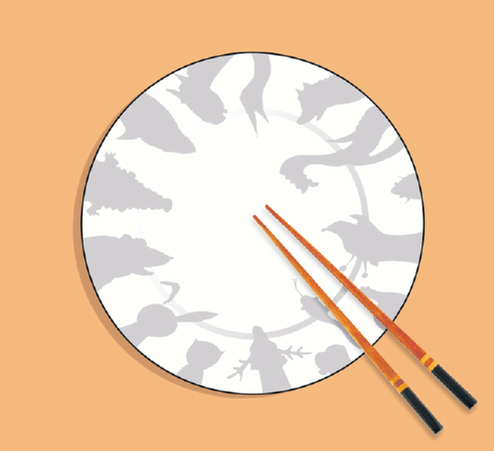A culinary warning to protect the wildlife

 |
| HE YING/CHINA DAILY |
Chinese people, known for their love for food and exquisite cuisines, were naturally drawn to reports on two seafood products in foreign countries. In late April, a post in the official account of Denmark's embassy in Beijing on Weibo, a Twitter-like Chinese website, said the coastline of the Scandinavian country has been plagued by a large number of "wild" oysters from the Pacific. The post also said local residents don't know how to deal with the oyster "invasion" and asked Chinese tourists to visit the country on a special "oyster-eating tour".
And earlier this month, a report by the Australian Broadcasting Corporation also drew the attention of many Chinese. The report said tens of thousands of "wild" salmons swim close to the Parry Beach in Southwest Australia to spawn every autumn. And since fishermen catch tons of salmon and local residents, who find it hard to bear the fishy smell, use them as baits for lobsters, most of the huge salmon catch goes to "waste".
Many Chinese lamented the huge waste of oysters and salmons. Chinese people's diet consists of perhaps the widest variety of food, from vegetables and fruits to meats and seafood. And that might be the reason why reports saying that Danes and Australians don't know what to do with the huge "cache" of oysters and salmons seem so ludicrous to the Chinese people. Some people even jokingly posted comments on the Denmark embassy's account saying that once Chinese arrived in groups in Denmark, the bivalve mollusks would soon make it to the list of endangered species.
Jokes aside, one of the main reasons the two news reports caught the attention of Chinese people is the word "wild". To begin with, most of the oysters we get in markets are farmed-oyster farming started decades ago-and several years ago the United States started captive breeding of salmons.
The word "wild" has a fascinating effect on Chinese people also because hardly any animals survive in large numbers in the wild in China. They see the abundance of "wild" oysters and salmons in Denmark and Australia, respectively, as not only a gift of nature, but also a sign of good environmental protection.
China has lost much of its wildlife population thanks partly to its rapid economic growth, which has had a huge impact on its environment because of severe air, water and soil pollution.
Because of the insatiable appetite of some people, many wild animals have entered the list of endangered species or have become extinct. For example, the Chinese pangolin, whose scales many falsely believe have health benefits, can no longer be found in the wild because of over-hunting. The wild yellow croaker, which was abundant in the East China Sea in the 1950s, has become a memory for many due to over-fishing. And the Yangtze River's knifefish, a delicacy for many Chinese, is fast moving toward extinction.
The reports on the oysters and salmons, which unwittingly highlighted the sharp contrast between China and some foreign countries, should be a warning for us that, if we do not better protect the environment, we could soon lose all the wild animals in the country.
Given that hunger and starvation have haunted Chinese people down the ages, right up to the 1970s, many people's mouth-watering response to the two news reports is not surprising. But times have changed. Although China still has a relatively large number of poor people, starvation is a thing of the past. Therefore the consumption of wild animals to satiate hunger too should become a thing of the past.
Chinese people should also abandon their superstitious belief that some wild animals' parts have health benefits, and allow wildlife to survive. And, hence, instead of embarking an oyster-eating tour to Denmark or paying a visit to Australia to savor salmon, let's make more efforts to repair our environment and protect our wildlife, because they will eventually save us from extinction.
The writer is an editor with China Daily.
































